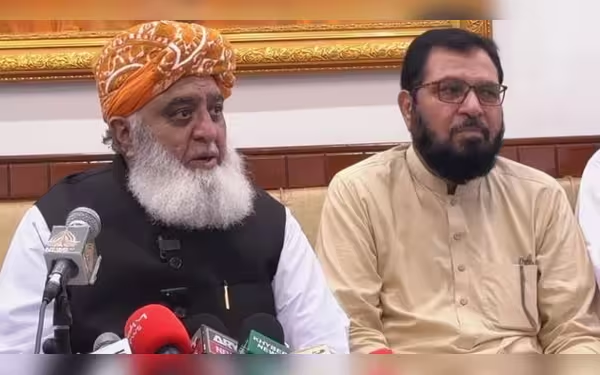Thursday, November 7, 2024 02:35 PM
JUI-F Chief Re-Elected Amid Political Turmoil in Pakistan
- JUI-F chief re-elected at Peshawar meeting.
- Criticism of government’s legitimacy intensifies.
- Political tensions expected to rise in Pakistan.
 Image Credits: thenews.com.pk
Image Credits: thenews.com.pkJUI-F re-elects its chief, raising concerns over government legitimacy amid Pakistan's political turmoil.
In a significant political development, the Jamiat Ulema-e-Islam (F) party has re-elected its chief, a move that has stirred discussions across Pakistan. The elections were held during a general council meeting at the Mufti Mehmood Markaz in Peshawar, a venue known for its historical importance in the party's activities. This re-election comes at a time when the political landscape in Pakistan is quite turbulent, with various parties vying for influence and power.
Following his re-election, the cleric did not hold back in expressing his views on the current government. He stated that the "fake parliament lacks a legitimate mandate for a major constitutional amendment." This statement reflects a growing sentiment among certain political factions that question the legitimacy of the current government and its decisions. The term "fake parliament" suggests a deep-seated frustration with the political process, indicating that many believe the current assembly does not represent the true will of the people.
The JUI-F, under the leadership of its re-elected chief, is likely to continue its critical stance against the government. This could lead to increased political tension as the party seeks to mobilize its supporters and challenge the status quo. The cleric's remarks may resonate with many citizens who feel disillusioned with the political system, potentially galvanizing a movement for change.
As Pakistan navigates through these challenging political waters, the implications of such leadership changes and statements cannot be underestimated. The re-election of the JUI-F chief may not only impact the party's direction but also influence the broader political discourse in the country. It serves as a reminder that in politics, leadership and legitimacy are often intertwined, and the voices of the people must be heard for a truly representative government to thrive.













